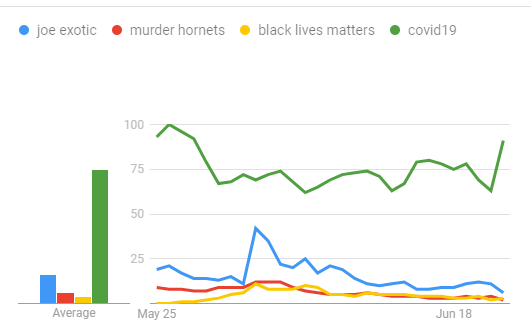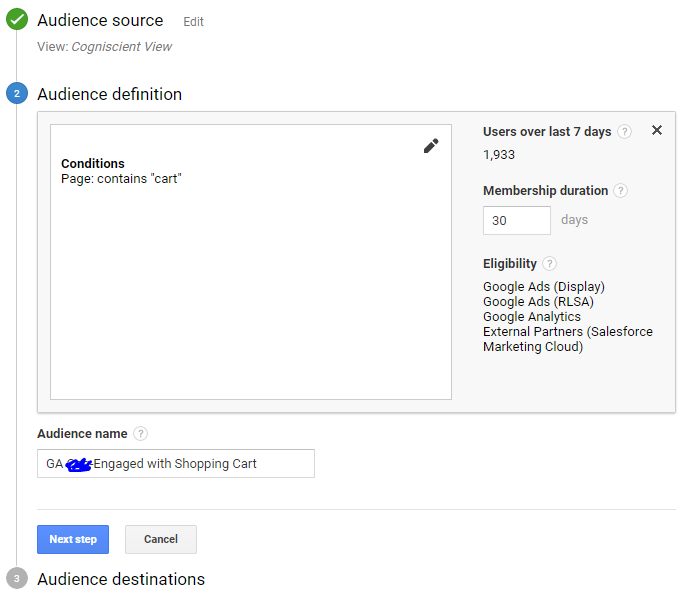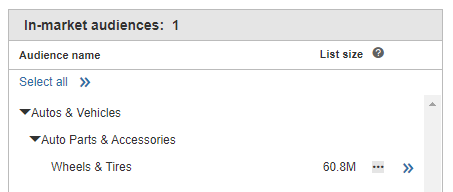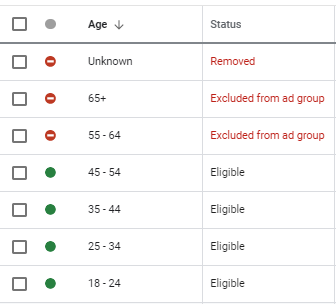30 Jun How to Weed Out Less Qualified Audiences from Your PPC Campaigns via @jonkagan
To my fellow marketer.
If you’re reading this, then it is early July, you’ve made it this far in the game of “Let’s See What Else Can Happen in 2020”.
God willing, the Netflix docu-series phenomenon about a mulleted disgraced zookeeper has finally ended (popular opinion: Carol killed her husband and fed him to her tigers).
You must return to your computer and start pushing your ads to masses once again.
But you may have your hands a bit full.
Between social distancing from a pandemic, rallies for equality and police reform, a damaged economy, and oh yeah: murder hornets.

 No one could’ve expected this
No one could’ve expected thisBut there are caveats:
Consumer sentiment is down, unemployment is spiking, if you are curbside servicing, then you just don’t exist.
And through it all, there are still consumers with the champagne dreams but the “Two-Buck Chuck” resources, that are still seeing your ads and spending your ad dollars.
Therefore, your new additional skill set that you must bring to work, is to stop focusing on reach and frequency of the consumer.
It is now to decide just who is even worthy enough to see your ads in the first place.
Who Is Worthy to See Your Ads?
Net-net, not everyone who is looking at your ad, is truly qualified.
Therefore, you should not be showing your ad to everyone.
You must decide who is truly worth spending your next dollar on.
As brands are forced to tighten their belts, they must now become more discriminating in their prospecting efforts, to help the bottom line.
One would think that would always be the case, but the reality is, this move helps ROI only.
It slows the growth of revenue.
Therefore the thought is: control costs now to regain profitability.
Then aim for revenue at a later period (recommended more gradually).
Important first step: Identify who your ideal customer is.
Important disclaimer: Identify who your ideal customer is/has been – not who you think it is going to be/should be.
Be sure to pore over your analytics and conversion data to decipher this.
Otherwise, any future steps are pointless.

 Isolating age, gender, and interests to determine the ideal consumer.
Isolating age, gender, and interests to determine the ideal consumer.To weed out the less qualified, and still feed the top of the funnel and prospect, you will need to lean heavy into audience exclusion and audience targeting.
Yes, they are two similar but different things.
For a quick refresher.
Audience Targeting
The direct targeting of a specific group of consumers, who fall within a certain characteristic(s), enabling everyone that meets it, see the ad.
For example: “I am selling a luxury car with a high price point, so I am only showing the ad to those whose household income is in the top 10%”.
Audience Exclusion
Indirectly targeting an audience by minimizing the ad units reach, by excluding and/or blocking of consumers based on certain characteristic(s).
For example: “I am excluding homeowners, so they are not served my apartment rental ads”.
(Warning, a small rant is about to transpire.)
No, it is not ideal for your business or really anyone.
But we’re working in/into a recession.
Therefore, like 2007-2009, marketers must think outside the box.
Otherwise, your business won’t be around for the next recession.
Now back to the topic at hand, how does one use these targets and exclusions to tighten their belts?
Audience Targeting
This is not rocket science, and more importantly, it doesn’t need to be applied account-wide, just high (sometimes mid) funnel initiatives.
Particularly in search, the more specific the query (often mid to long-tail searches) the higher the qualification, the higher likelihood of the conversion.
But those are often few and far between (terrible for prospecting in terms of feeding the top of the funnel).
So audience targeting becomes a necessity for high volume keywords, otherwise, you’re spending your already limited budget on everyone (not ideal).
The easiest form of audience targeting is retargeting.
Cart abandoners are the lowest-hanging fruit.
It is a simple setup and deploy. (I am a huge advocate of it via Google Analytics.):

 So easy, a “caveman can do it”
So easy, a “caveman can do it”But keep in mind, if you’re still getting those queries off a top of funnel query, then the qualification is already lower to start off with.
If you proceed with this method, throw in some additional layers to further qualify them, such as:
- Age.
- Household income.
- Or onsite behavior like “added 3+ products to cart.”
To reach a wider and also prospect under the guise of audience targeting, lean heavy into the in-market audiences.
Frequently we’ll isolate in-market audiences by ad groups/campaigns upfront for future learning.
Then when the time is right, deploy them as a new strategy going forward:

 Same keywords and ads, different audiences.
Same keywords and ads, different audiences.In this scenario, we used an automotive parts in-market audience to segment out the ad groups vs. that of the general audience.
While the in-market audience has a 17% higher CPC, it has a 66% higher conversion rate.
This means comparing a $1,000 spend effort between the in-market audience vs the general audience, we would see 42% more leads.
Both Google and Bing have pre-built in-market audience lists, with new ones deploying regularly.

 Yes, even Bing can do it
Yes, even Bing can do itBut a nice little function these days is Google building them on their own based on machine learning progressively, for you to choose from later for display efforts.

 The machines are making the audiences for us now
The machines are making the audiences for us nowUsing these tools, we have taken a step to prequalify the audience who we’re prospecting, so if they don’t convert at first, at least they are pulled into our remarketing lists as a degree of higher qualification for later.
Net-net: These consumers are deemed worthy of seeing our ads.
Audience Exclusion
To put it bluntly, exclusion is a vastly underrated yet wildly glorified version of a search negative keyword list.
But rather than saying we don’t want to show if someone searches for XYZ, we say, we don’t want to show for you.
When we exclude in any media, we are saying: “I am open to anyone seeing my ads, providing they aren’t [fill in the blank].”
I know it sounds harsh, but it is highly effective and important.
Remember, not everyone is right for your brand, but they may still try and find a way to see the ads.
Exclusions can be simplistic, like geography, time of day, etc.
Or they can be much more specific.
One of the key times I see this needed is for YouTube and GDN.
You want to capture a wide audience but know not everyone is right.

 If they visit this content, they aren’t for us.
If they visit this content, they aren’t for us.
 We know the older demo likes to browse but not convert.
We know the older demo likes to browse but not convert.Net-net: You’ll get more visitors, slightly less qualified as audience targeting.
But you also maintain control of who you’re spending ad dollars on.
Takeaway
We are about to enter some incredibly uncertain times, not just in our industry, but in society as we know it.
Having cash on hand doesn’t help much when you’re in the hole financially.
Control your bottom line with efficiency for a short term, by limiting your highest volume traffic.
I know it sounds silly when you say it out loud.
But it’ll make it easier to collect revenue later, that is much less profitable.
More Resources:
- A Complete Guide to PPC Ad Targeting Options
- 8 Dos & Don’ts of Search Audiences
- 5 Easy Ways to Improve Your PPC Campaigns with Audiences
Image Credits
All screenshots taken by author, June 2020
Sorry, the comment form is closed at this time.